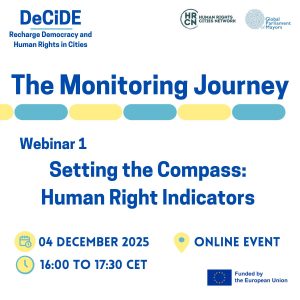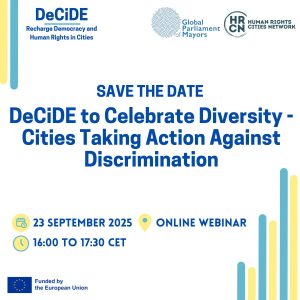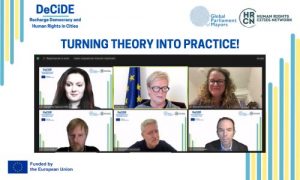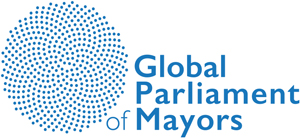Introduting DeCiDE: "Boost Democratic Participation in Cities to Recharge Democracy in Europe"
The Human Rights Cities Network and the Global Parliament of Mayors proudly present the innovative DeCiDE project. Our two-year initiative involves municipalities and civil society organizations from selected cities co-creating human rights indicators and monitoring tools. Our aim is to enhance urban democracy and human rights practices in Europe, through community participation in human rights monitoring and knowledge sharing between cities’ networks.
“The DeCiDE project is a testament to our commitment to human rights at the local level. By co-producing a set of indicators and monitoring tools with local administrations and civil society representatives, we are placing people and their rights at the center of public policies and practices.” – Mayor Ricardo Rio GPM Chair & Mayor of Braga
Why DeCiDE?
In a rapidly changing political landscape, cities are at the forefront of tackling unique challenges. The DeCiDE project is driven by the belief that strong, inclusive urban governance is key to a thriving democracy. By prioritizing human rights, cities can not only solve pressing issues but also create vibrant, just communities where every voice is heard.
In 2024, many European mayors selected social inclusion and equity as a priority of the utmost importance. This shows the growing desire to put human rights at the center of local governance.
Our Objectives:
Support ten European cities to improve monitoring capacities of public service delivery with a participatory and inclusive approach;
Strengthen cities and local civil society’s capacity to guarantee democratic participation and access to human rights through enhanced consultation mechanisms with Civil Society Organizations (CSOs) in the design of public services;
Improve knowledge of the EU Charter of Fundamental Rights through capacity building and exchange of experience to translate it into practices at local level, promoting solidarity among citizens and engaging transnational city networks in policy dialogue.
Project duration:
1 September 2025 – 31 August 2027
Scope:
10 cities across 10 European countries
How?
- Methodology Development: Co-create a participatory, inclusive monitoring system with 10 cities.
Training: Equip participating cities with the skills to implement the monitoring system.
Implementation: Roll out the monitoring system across all cities
Best Practices: Standardize and share successful approaches among cities.
Policy Dialogue: Facilitate discussions with citizens, EU institutions, and policymakers.
Raise Awareness: Host high-level discussions to promote the monitoring system.
DeCiDE is more than a project—it’s a call to action. It reflects our belief that cities have the power to reshape democracy and ensure human rights for all.
YOUR CITY CAN STILL JOIN US!
Please reach out to our project coordinator: lea.blanchez@humanrightscities.net
Project Activities:

WEBINAR – Building the Map !
Building the Map! The DeCiDE Core Indicators and Monitoring & Evaluation Matrix DeCiDE: The Monitoring Journey, is a five-part series of guiding webinars designed to accompany cities through the full cycle of the Human Rights Standardized Monitoring System (SMS) — from concept to practice. The series is part of the “Boost Democratic Participation in

WEBINAR 1: Setting the Compass: Human Right Indicators
REGISTER HERE! DeCiDE: The Monitoring Journey, is a five-part series of guiding webinars designed to accompany cities through the full cycle of the Human Rights Standardized Monitoring System (SMS) — from concept to practice. The series is part of the “Boost Democratic Participation in Cities to Recharge Democracy in Europe” – DeCiDE project. This

DeCiDE: The Monitoring Journey
The Monitoring Journey, a five-part series of guiding webinars designed to accompany cities through the full cycle of the Human Rights Monitoring System (SMS) — from concept to practice. The series supports cities in co-developing and testing a participatory monitoring framework grounded in human rights principles, data, and inclusive governance. Through interactive exchanges and

WEBINAR : DeCiDE to Celebrate Diversity
📢 Save the Date! DeCiDE to Celebrate Diversity – Cities Taking Action Against Discrimination On 23 September, 16:00–17:30 CET, we’ll be hosting a webinar exploring how cities can take action against discrimination and foster more inclusive communities. The webinar is part of the DeCiDE project broader effort to co-produce a standardized local human rights monitoring

Webinar 25 June : DeCiDE: Monitoring Human Rights & The EU Charter of Fundamental Rights
🌍 25 June 2025 | 16:00 CEST | Online via Zoom Register here The Global Parliament of Mayors (GPM), in partnership with the Human Rights Cities Network (HRCN), is pleased to invite you to a webinar exploring how cities across Europe are taking action to monitor and advance human rights at the local level, as part of

Human Rights Monitoring: Turn Theory into Practice
“Where, after all, do universal human rights begin? In small places, close to home – so close and so small that they cannot be seen on any maps of the world.” Eleanor Roosevelt Monitoring human rights at the local level is a fundamental step to becoming a human rights city and ensuring the rights

This project is funded by the European Union. Views and opinions expressed are however those of the author(s) only and do not necessarily reflect those of the European Union or European Commission. Neither the European Union nor the granting authority can be held responsible for them.



